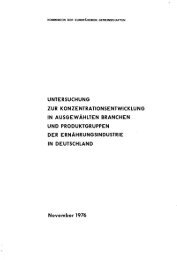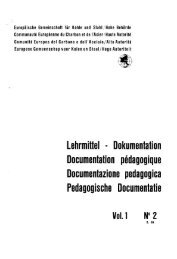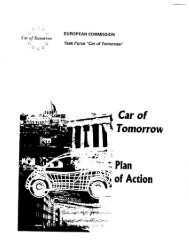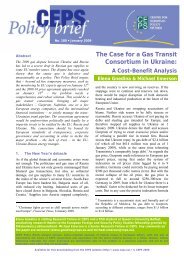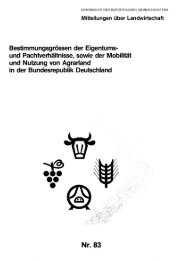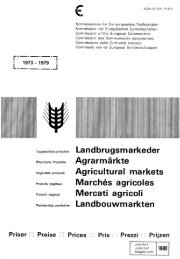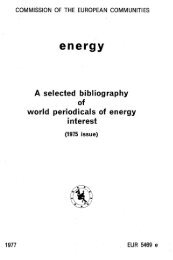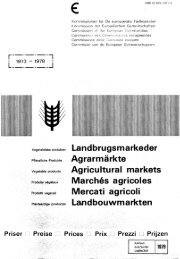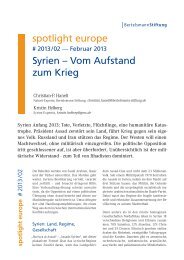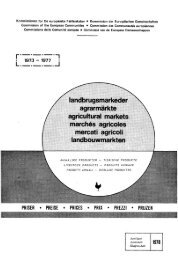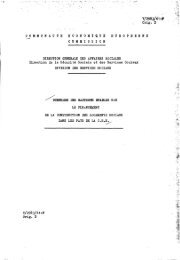Survey on Rules on Loss of Nationality in International Treaties and ...
Survey on Rules on Loss of Nationality in International Treaties and ...
Survey on Rules on Loss of Nationality in International Treaties and ...
Create successful ePaper yourself
Turn your PDF publications into a flip-book with our unique Google optimized e-Paper software.
6 RENÉ DE GROOT<br />
this C<strong>on</strong>venti<strong>on</strong>. 21 Of note, the Netherl<strong>and</strong>s denounced the C<strong>on</strong>venti<strong>on</strong> <strong>in</strong> 1992 because it c<strong>on</strong>ta<strong>in</strong>s some rules<br />
that c<strong>on</strong>flict with the complete equal treatment <strong>of</strong> men <strong>and</strong> women <strong>in</strong> nati<strong>on</strong>ality law as prescribed by the 1979<br />
C<strong>on</strong>venti<strong>on</strong> <strong>on</strong> the Elim<strong>in</strong>ati<strong>on</strong> <strong>of</strong> All Forms <strong>of</strong> Discrim<strong>in</strong>ati<strong>on</strong> Aga<strong>in</strong>st Women. 22 Luxemburg <strong>and</strong> the United<br />
K<strong>in</strong>gdom did the same <strong>in</strong> 2007 <strong>and</strong> 1982, respectively.<br />
2.5 C<strong>on</strong>venti<strong>on</strong> <strong>on</strong> the Reducti<strong>on</strong> <strong>of</strong> Statelessness 23<br />
In order to implement the right to a nati<strong>on</strong>ality as enshr<strong>in</strong>ed <strong>in</strong> Article 15 <strong>of</strong> the Universal Declarati<strong>on</strong> <strong>of</strong><br />
Human Rights, a resoluti<strong>on</strong> <strong>of</strong> the UN Ec<strong>on</strong>omic <strong>and</strong> Social Council (ECOSOC) adopted <strong>in</strong> August 1950<br />
<strong>in</strong>structed the Internati<strong>on</strong>al Law Commissi<strong>on</strong> to beg<strong>in</strong> work <strong>on</strong> a draft c<strong>on</strong>venti<strong>on</strong> (or c<strong>on</strong>venti<strong>on</strong>s) for the<br />
elim<strong>in</strong>ati<strong>on</strong> <strong>of</strong> statelessness. 24 The C<strong>on</strong>venti<strong>on</strong> <strong>on</strong> the Reducti<strong>on</strong> <strong>of</strong> Statelessness was f<strong>in</strong>ally adopted <strong>on</strong> 30<br />
August 1961 <strong>and</strong> entered <strong>in</strong>to force <strong>on</strong> 13 December 1975, two years after the sixth accessi<strong>on</strong> (see Article<br />
18(1)). The C<strong>on</strong>venti<strong>on</strong> is b<strong>in</strong>d<strong>in</strong>g for 51 States. Of the Member States <strong>of</strong> the European Uni<strong>on</strong>, 16 are bound<br />
by this C<strong>on</strong>venti<strong>on</strong>. 2526<br />
The object <strong>and</strong> purpose <strong>of</strong> the 1961 C<strong>on</strong>venti<strong>on</strong> is not the complete elim<strong>in</strong>ati<strong>on</strong> <strong>of</strong> statelessness, but the<br />
reducti<strong>on</strong> <strong>of</strong> cases <strong>of</strong> statelessness at birth <strong>and</strong> <strong>of</strong> the causes <strong>of</strong> statelessness by the automatic (ex lege) loss <strong>of</strong><br />
nati<strong>on</strong>ality later <strong>in</strong> life or through deprivati<strong>on</strong> <strong>of</strong> nati<strong>on</strong>ality.<br />
It was an important development <strong>of</strong> <strong>in</strong>ternati<strong>on</strong>al law that the 1961 C<strong>on</strong>venti<strong>on</strong> gives a child who would<br />
otherwise be stateless the right to acquire the nati<strong>on</strong>ality <strong>of</strong> its country <strong>of</strong> birth through <strong>on</strong>e <strong>of</strong> two means.<br />
First, a State may grant its nati<strong>on</strong>ality to otherwise stateless children born <strong>in</strong> its territory automatically by<br />
operati<strong>on</strong> <strong>of</strong> law (ex lege). Sec<strong>on</strong>d, a State may grant nati<strong>on</strong>ality to otherwise stateless pers<strong>on</strong>s born <strong>in</strong> their<br />
territory later up<strong>on</strong> applicati<strong>on</strong>. The grant<strong>in</strong>g <strong>of</strong> nati<strong>on</strong>ality <strong>on</strong> applicati<strong>on</strong> may, accord<strong>in</strong>g to Article 1(2), be<br />
subject to <strong>on</strong>e or more <strong>of</strong> four c<strong>on</strong>diti<strong>on</strong>s. 27<br />
The C<strong>on</strong>venti<strong>on</strong> further <strong>in</strong>cludes provisi<strong>on</strong>s <strong>in</strong> favour <strong>of</strong> foundl<strong>in</strong>gs (Article 2), <strong>on</strong> acquisiti<strong>on</strong> <strong>of</strong> the<br />
nati<strong>on</strong>ality <strong>of</strong> the mother by descent 28 if the child was born <strong>in</strong> her country’s territory <strong>and</strong> would otherwise be<br />
stateless (Article 1(3)), <strong>on</strong> acquisiti<strong>on</strong> <strong>of</strong> the nati<strong>on</strong>ality <strong>of</strong> a parent by descent via an applicati<strong>on</strong> procedure<br />
for <strong>in</strong>dividuals who do not acquire nati<strong>on</strong>ality <strong>of</strong> the country <strong>of</strong> their birth (Article 1(4)), <strong>and</strong> <strong>on</strong> acquisiti<strong>on</strong><br />
<strong>of</strong> the nati<strong>on</strong>ality <strong>of</strong> a parent by descent for <strong>in</strong>dividuals born abroad who would otherwise be stateless<br />
(Article 4). Article 1(4) <strong>and</strong> Article 4(2) allow excepti<strong>on</strong>s to their rules under some circumstances. 29<br />
<strong>Loss</strong> <strong>of</strong> nati<strong>on</strong>ality (ex lege) is, <strong>in</strong> pr<strong>in</strong>ciple, prohibited by the 1961 C<strong>on</strong>venti<strong>on</strong> if it would cause<br />
statelessness (Articles 5-8). Two excepti<strong>on</strong>s are expressly allowed, however. First, Article 7(4) <strong>of</strong> the 1961<br />
C<strong>on</strong>venti<strong>on</strong> permits loss <strong>of</strong> nati<strong>on</strong>ality by operati<strong>on</strong> <strong>of</strong> law for naturalised pers<strong>on</strong>s who reside abroad for a<br />
period <strong>of</strong> not less than seven c<strong>on</strong>secutive years if the <strong>in</strong>dividual fails to declare to the appropriate authority<br />
an <strong>in</strong>tenti<strong>on</strong> to reta<strong>in</strong> the nati<strong>on</strong>ality. Sec<strong>on</strong>d, the 1961 C<strong>on</strong>venti<strong>on</strong> allows for the loss <strong>of</strong> nati<strong>on</strong>ality by<br />
21 Austria, Bulgaria, Cyprus, Czech Republic, Denmark, F<strong>in</strong>l<strong>and</strong>, Germany, Hungary, Latvia, Pol<strong>and</strong>, Romania,<br />
Slovakia, Slovenia <strong>and</strong> Sweden.<br />
22 See De Groot (2012c).<br />
23 UNTS 989, 1759 (http://treaties.un.org/pages/ViewDetails.aspx?src=IND&mtdsg_no=V-4&chapter=5&lang=en).<br />
24 Resoluti<strong>on</strong> 319, B III.<br />
25 Austria, Bulgaria, Croatia, Czech republic, Denmark, F<strong>in</strong>l<strong>and</strong>, Germany, Hungary, Irel<strong>and</strong>, Latvia, the Netherl<strong>and</strong>s,<br />
Portugal, Romania, Slovakia, Sweden <strong>and</strong> the United K<strong>in</strong>gdom.<br />
26 Austria <strong>and</strong> Irel<strong>and</strong> made reservati<strong>on</strong>s. Austria reta<strong>in</strong>ed the right to deprive a pers<strong>on</strong> <strong>of</strong> his nati<strong>on</strong>ality if such pers<strong>on</strong><br />
enters, <strong>on</strong> his own free will, the military service <strong>of</strong> a foreign State. Furthermore, Austria reta<strong>in</strong>ed the right to deprive a<br />
pers<strong>on</strong> <strong>of</strong> his nati<strong>on</strong>ality if, be<strong>in</strong>g <strong>in</strong> the service <strong>of</strong> a foreign State, he c<strong>on</strong>ducts himself <strong>in</strong> a manner seriously prejudicial<br />
to the <strong>in</strong>terests or to the prestige <strong>of</strong> the Republic <strong>of</strong> Austria. Irel<strong>and</strong> reta<strong>in</strong>ed the right to deprive a naturalised Irish<br />
citizen <strong>of</strong> his citizenship pursuant to Secti<strong>on</strong> 19 (1) (b) <strong>of</strong> the Irish Nati<strong>on</strong>ality <strong>and</strong> Citizenship Act, 1956, <strong>on</strong> grounds<br />
specified <strong>in</strong> the aforesaid paragraph.<br />
27 These c<strong>on</strong>diti<strong>on</strong>s are discussed <strong>in</strong> greater detail <strong>in</strong> De Groot (2012a).<br />
28 Iure sangu<strong>in</strong>is, i.e. by jus sangu<strong>in</strong>is. This means literally: by right <strong>of</strong> the blood, a pers<strong>on</strong> acquires the nati<strong>on</strong>ality <strong>of</strong> a<br />
parent at birth or by the establishment <strong>of</strong> a child-parent family relati<strong>on</strong>ship.<br />
29 All <strong>of</strong> these provisi<strong>on</strong>s are discussed at greater length <strong>in</strong> De Groot (2012a).



